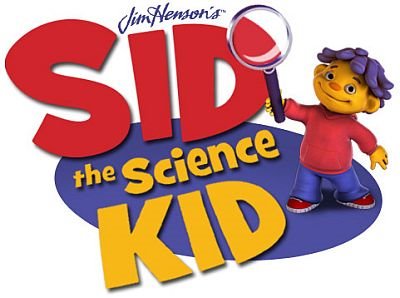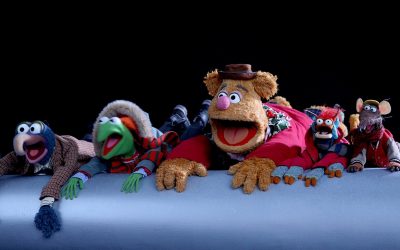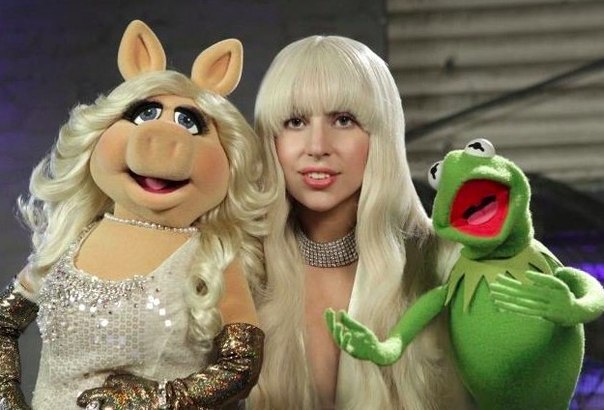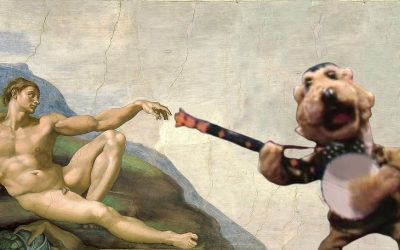Sid the Science Kid is a new children’s show about the son of Bill Nye the Science Guy. No, that’s not true. The show is about an inquisitive little boy who is rarely found without his toy microphone, and who wants to know “everything about everything.” It’s produced by the Jim Henson Company using the Henson Digital Performance System (which is a magical spell that turns puppetry into computer animation), and it premiered on on PBS last month. I sat down to watch the first four episodes to see if I learned anything about anything.
So, what’s the first episode about? When I was a kid, I was really into dinosaurs, so maybe it’s about dinosaurs. Oh, or germs. Those are cool. Or maybe something about fire? Kids love setting stuff on fire! We open on Sid in his room, and he tells us that today’s show is about… charts!
Huh. Okay, I guess it’s useful for kids to learn about charts. Sid wants to know, “Why do we need charts?” Of course, it would take a kid to ask a question like that, because to a grown-up it’s very obvious why we need charts. We need them because… well, it’s… when you use the Pythagorean… um… Well, I know why we need charts, but I’m not going to say anything so I don’t spoil this episode for anyone.
Now Sid’s mom calls him downstairs for Breakfast Time, and we meet Sid’s family. I read a review somewhere that mentioned Sid’s parents being multi-ethnic. I don’t think I would have even noticed otherwise, but it seems to be true. That’s pretty cool, and it ensures that the character will be easily identifiable for kids with one yellow parent and one orange parent. Is it weird that I think Sid’s mom is a little bit hot? Actually, forget I said that.
Speaking of Sid, there’s something about him that reminds me of the comedian Patton Oswalt. Is it his voice? (Sid is voiced and digitally puppeteered by Drew Massey.) Is it his pleasantly round face? I’m not sure, but I like to think they’d get along. Oswalt could make jokes about food while Sid asked about the preservatives in his Fruity Pebbles.
Sid learns more about charts at breakfast, but he still remembers to eat. I’m guessing they’ll make sure to show Sid eating a healthy breakfast in every episode, at least until they decide to do a show in which Sid asks the question, “What will happen to me if I eat this 4-month-old burrito I found in the back of the refrigerator for breakfast?” Then his Mom drives him to school, and he sings a song as he finds his friends on the playground. The animation here is pretty great — they’re all moving like real kids, and there are camera moves and everything. I don’t understand exactly how digital puppetry works (maybe that’s a question for Dan the Computer Animation Expert Man), but I’m guessing this sequence involved some full-body motion capture.
Sid’s friends are Gerald (a goofball who, in real life, would be prescribed methylphenidate), Gabriella (who wears a skirt AND jeans, a bold fashion statement), and May, who’s a bit spacey. The characterization doesn’t go very deep, but they all represent types you would probably encounter in preschool. I know my preschool had a Gerald. Come to think of it, though, I’m not sure they’re in preschool. It could conceivably be kindergarten. In the four episodes I watched, I don’t think they ever said how old Sid is. Also, why are there only four children in Sid’s class? Is it an extremely exclusive private school, or just a sparsely populated area? More importantly, who cares?
So then it’s “Rug Time,” which means time for class to start, with Sid’s teacher Susie. It seems awfully informal that they just call their teacher “Susie” — not even a “Ms.” — but whatever. And they talk about charts. What else? After watching four episodes, I noticed that Sid seems to dictate every day’s curriculum. Wait a minute, what kind of school is this? Does Susie ever even bother coming up with a lesson plan, or does she just wait to see what Sid wants to talk about? Then she takes all the kids to the “Super Fab Lab” and has them scribble something to do with charts in their science notebooks.
After that, it’s playtime, which means it’s time for “Good Laughternoon.” Now, kids under the age of 8 have never heard of Rowan & Martin’s Laugh-in. (Heck, most kids under the age of 42 have never heard of Laugh-in.) So they won’t realize that Good Laughternoon is an homage/ripoff of one of that show’s famous bits, as Sid and friends open multi-colored, multi-shaped doors on their playscape and tell… well, they’re not real jokes, exactly. Henson keeps promoting Sid as a “comedy show” for kids, but this kind of stuff makes it seem more like a comedy show by kids. Here are some examples from the four episodes I watched:
May: What does a chart say when it sneezes? Ahh-ahh-CHART!
Gabriella: Knock knock! (Who’s there?) One! (One who?) One two three four five!
Gerald: I like yogurt!
Sid: That’s not a joke.
Gerald: I know, but I’m really hungry!
Okay, so maybe that last one is a little bit funny. But you see what I mean. Sure, these sound like jokes made up by children, so it’s accurate enough. But it indicates that this will not be one of those kids’ shows that parents will look forward to watching with their kids. On the other hand, there also plenty of adult characters who talk more or less like adults, and the show’s obnoxious, so parents won’t run away screaming from it either. So I guess that’s okay. But the fact that Sid often has to click the laugh track button on his toy microphone to let us know something is supposed to be a joke is telling.
 Where was I? I guess I kinda blew all my critique in that last paragraph. Oh, right: Soon it’s Time for Susie to Sing, and she takes Sid’s microphone and whips out a catchy pop song about the day’s subject; in this case, charts. In the episode about magnifying small things, she sings a song about magnifying glasses, and in the estimation show she sings about estimating. So
Where was I? I guess I kinda blew all my critique in that last paragraph. Oh, right: Soon it’s Time for Susie to Sing, and she takes Sid’s microphone and whips out a catchy pop song about the day’s subject; in this case, charts. In the episode about magnifying small things, she sings a song about magnifying glasses, and in the estimation show she sings about estimating. So
I take back what I said about Susie earlier — Despite letting a little boy decide what the lesson for the day will be, she apparently goes to the trouble of memorizing an endlesss number songs that pertain to the subject he might choose on any given day. She has no idea what the class might be talking about from day to day, but she apparently has a song prepared for every occasion. Now that’s dedication.
After school, Sid is picked up by his Grandma, who happens to be the show’s best character. She asks Sid about what he learned in school, and she chuckles to herself a lot, as any self-respecting nutty old lady would. And when Sid explains his chore chart reward system, she pointedly explains that when she was Sid’s age she was expected to do chores without any kind of reward. I like Grandma. I want a Grandma spinoff.
After dinner with his family, Sid returns to his room, where he comes up with today’s Super Duper Ooper Schmooper Big Idea. (You may or may not recall that when this series was first announced as being in development, it was called What’s the Big Idea?) Today’s idea: A really big chart. Yep, that’s a big idea all right.
And that’s the show. If nothing else, it’s impressive that they filled 30 minutes with nothing but charts. When Elmo talks about feet or bathtubs or clothes or whatever, he only does 15 minutes.
And yeah, I watched the other three episodes, and I was going to describe them in detail here, but I think you get the idea. Every episode seems to follow the same basic format, with some variation: Sid’s intro, then Breakfast Time, then Looking for Friends (with a minute and 35 seconds of recycled animation every show!), Rug Time, Super Fab Lab, Playtime, Susie sings, Grandma, family time, and the Super Gooper Hooper Pooper Big Idea. 
Oh, and each episode begins with Sid asking a question that presents the theme. Basically, he’s the Carrie Bradshaw of budding scientists. “How do roly polys move?” “How many seashells are in my jar?” “How can I use my ruler to measure a whale?” “How do you know if you’re good in bed?” Hmm… I think one of those might actually be from Sex and the City, but I have no idea which one.
So it’s not a groundbreaking show, but it has a very specific goal — to get kids interested in the idea of science as something you do, rather than something you read about — and I think it’ll hit that goal. And yes, I learned something: In the second episode, Sid’s dad reveals that roly polys (aka “doodle bugs”) are crustaceans, not insects. I don’t think I knew that.
They even get into a few more complicated lessons, like the concept of “non-standard measurements,” which is impressive. I have to wonder if the target audience will understand it all, but I’m sure they’ve done their research. And hey, getting kids excited about science can’t be a bad thing.
Unless they blow themselves up. That would be bad.
Click here to comment on this article, to talk about Sid the Science Kid, and to measure some whales, all on the Tough Pigs forum!





